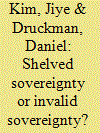|
|
|
Sort Order |
|
|
|
Items / Page
|
|
|
|
|
|
|
| Srl | Item |
| 1 |
ID:
189245


|
|
|
|
|
| Summary/Abstract |
This article examines the new prominence accorded to the “Indo-Pacific” (IP) concept in the strategic narratives championed by the US and its closest allies, (Japan and Australia), and then juxtaposes this with the responses of other key regional powers. To this purpose, Part I distils a concise conceptual model encompassing three interlocking facets – mental maps, political/ideological drivers, and visions of regional order – designed to structure the following empirical analyses. Part II then accesses this model to reveal how these facets are reflected in the discursive and policy-making practices of the US and its close allies, as embodied in their (combined) regional strategies. Next, Part III considers how a cross-section of major states in the region – India, South Korea, and China - have responded to this enterprise, to determine the degree to which they have adopted, accommodated or opposed the IP concept, or otherwise propose national alternatives to the US-centered project. It concludes that the IP concept is not simply an objective geopolitical descriptor, but rather a controversial and contested discursive field, subject to multiple interpretations. Such a polarizing concept will likely contribute to further sharpening of strategic mistrust and geopolitical competition amongst the region’s major powers.
|
|
|
|
|
|
|
|
|
|
|
|
|
|
|
|
| 2 |
ID:
192551


|
|
|
|
|
| Summary/Abstract |
This article examines how the Indo-Pacific powers, China and India, respond to international law and evaluates how effectively international law influences each state’s behavior. The role of norms and international legal regimes in the major Indo-Pacific flashpoints has become an inseparable justification of contestants’ claims over the years. We suggest that a state actor’s response to international law can be assessed using three criteria: the internalization, interpretation, and implementation of international law. The article investigates China and India as state actors and the United Nations Convention on the Law of the Sea as a case of international law. We assess these criteria by comparing the development of domestic laws by China and India in accordance with the United Nations Convention on the Law of the Sea (internalization), their declarations submitted to the United Nations Convention on the Law of the Sea provisions (interpretation), and their reaction to third-party arbitrations (implementation). By connecting the domestic and international legal actions of rising powers in the Indo-Pacific region, the article suggests that a state actor’s internalization, interpretation, and implementation of international law significantly indicate how international law impacts an individual state’s behavior in the international security arena. Thus, this article establishes critical connections between emerging security order, regional politics, and normative developments in the Indo-Pacific.
|
|
|
|
|
|
|
|
|
|
|
|
|
|
|
|
| 3 |
ID:
173953


|
|
|
|
|
| Summary/Abstract |
This article contributes to the current discourses on China’s diplomacy in the South China Sea disputes by asking: What does China want to achieve in the various negotiations? By comparing different versions of the multilateral Code of Conduct negotiations between 1992 and 2016, the authors find that the sovereignty issue has been shelved throughout the negotiations. We identify three factors that may account for this finding: the inconsistency of China’s official claims over time, China’s increased bargaining power, and the importance of the shelved sovereignty axiom since the era of Deng Xiaoping. The authors conclude that the normative game continues in the shadows of international norms represented by invalid sovereignty over the contested waters.
|
|
|
|
|
|
|
|
|
|
|
|
|
|
|
|
|
|
|
|
|